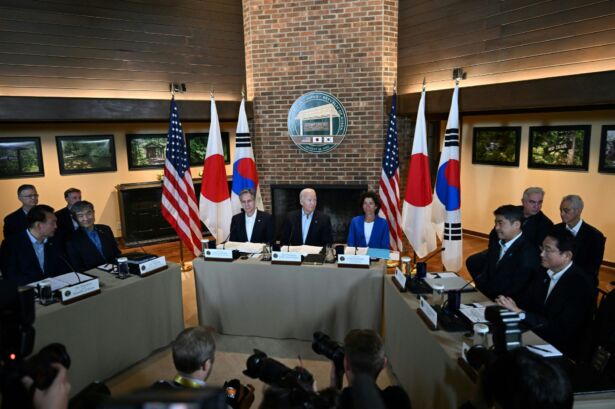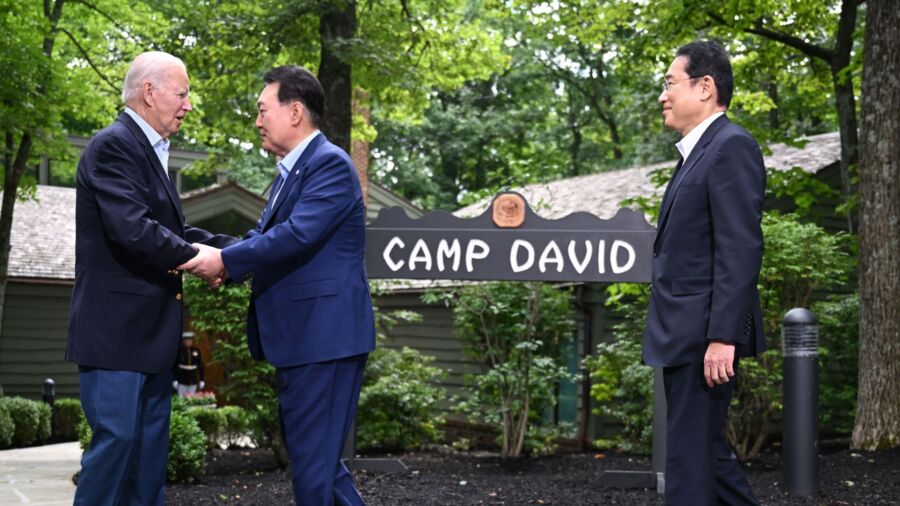President Joe Biden is holding a trilateral summit at Camp David with Japan and South Korea to set up new defense strategies against the increasing military coercion from Beijing.
While the summit brings two historic rivals, Japan and South Korea, together in the face of the regional threat from China, experts welcome the move, adding the close collaboration of the United States with Japan, South Korea, and other regional partners in Asia is an important step to deter a conflict initiated by the Chinese Communist Party (CCP).
A Historic Move
Anders Corr, a strategic analyst of international politics and security, welcomes the trilateral meeting as it brings two historic rivals together to accelerate regional peace.
Mr. Corr is the founder of risk consultancy Corr Analytics and publisher of the Journal of Political Risk. He spent five years working with U.S. military intelligence, including in the European and Asia-Pacific regions.
“Defending Taiwan from a China invasion would require extensive U.S. utilization of military bases in Japan, South Korea, and our other allies in the region, including the Philippines and Australia,” Mr. Corr said in an email to The Epoch Times.
“It is critical that Japan and South Korea mend fences on their historic grievances so that we can all move ahead with ensuring that the former hub-and-spoke alliance relations evolve into a more coordinated defensive network, including direct coordination between the Japanese and South Korean militaries,” said Mr. Corr.
To address the threat from the Communist regimes—Beijing and North Korea—South Korean President Yoon Suk-yeol made his move by calling for deeper security cooperation with the United States and Japan.
In a speech marking the end of Japanese colonial rule over the Korean Peninsula in 1945, South Korean President Yoon Suk-yeol said Japan is a partner sharing common values.
He praised the forthcoming summit at Camp David as “a new milestone in trilateral cooperation contributing to peace and prosperity on the Korean Peninsula and in the Indo-Pacific region,” Mr. Yoon said in a Liberation Day speech on Aug. 15.

A Vital Deterrence
Frank J. Gaffney, executive chairman at the Center for Security Policy, sees the summit as a way to enhance and strengthen the trilateral alliance between the United States, Japan, and South Korea, which has been badly strained in recent years.
Mr. Gaffney was acting assistant secretary of defense for international security policy in 1987 during the Reagan administration.
He believes it’s an opportunity for what’s the “obvious imperative of these three nations to collaborate closely” and “their mutual defense can take place once again” now that “there’s a more sensible conservative pro-American government in the Blue House,” said Mr. Gaffney. The Blue House is the residence of the South Korean president.
What’s more important, he believes, is that there is a “shared concern about the threat posed to each of them by the Chinese Communist Party,” said Mr. Gaffney in a telephone interview with The Epoch Times.
Kurt Campbell, coordinator for the Indo-Pacific on the National Security Council, described the months before the trilateral meeting as “a breath-taking kind of diplomacy that has been led by courageous leaders in both Japan and South Korea,” during a Brookings Institute event on Aug. 16.
“We will announce a number of things [including a] trilateral annual summit between the three leaders which we intend to abide by, a national security and secretary of state effort that will help prepare the way for that,” Mr. Campbell said. “We’re going to invest in technology to have a three-way hotline for the leaders and others inside their governments to communicate,” reported Breaking Defense.
Earlier, Reuters reported that the summit is also expected to lead to a joint statement between the countries that includes some language speaking to concerns about China’s desire to change the status of self-governed Taiwan, which it claims as its own territory.
The U.S., Japanese, and South Korean joint statement is set to include language on maintaining peace and stability in the Taiwan Strait, according to senior U.S. administration officials.
The Chinese side opposed the summit and called it “relevant countries assembling exclusionary groupings,” which “intensify antagonism and undermine the strategic security of other countries,” said the Foreign Ministry spokesperson Wang Wenbin at the regular press conference on Aug. 15.
In March 2022, China’s Foreign Minister Wang Yi claimed the U.S. Indo-Pacific strategy was “to establish an Indo-Pacific version of NATO,” adding that “perverse actions run counter to” regional peace.
Mr. Wang warned it could “not only push Taiwan into a precarious situation, but also bring unbearable consequences for the United States.”
Mr. Corr addressed the need for an Asian NATO in the face of the CCP’s threat to regional peace as early as 2014.
To survive, Asian democracies must create a more integrated security network, “What might be called an Asian Treaty Organization, patterned after the successful North Atlantic Treaty Organization in Europe and North America,” said Mr. Corr in an opinion piece in Nikkei Asia.
Mr. Gaffney told The Epoch Times that a close collaboration of the Asian democracies will serve as a warning to the CCP.
Be it a NATO-style alliance or a more scaled-down version of a partnership among the nations, “at the minimum military command arrangements” that integrates the forces of the United States, Japan, South Korea, Taiwan, Australia, and even India, is “absolutely vital at the moment if we are to try to persuade the Chinese that they will not benefit from an assault on Taiwan, and thereby prevent it,” he said
“If we’ve learned anything from the war in Ukraine, it is infinitely better to try to deter a conflict than to try to contend with it once it’s started,” added Mr. Gaffney.
Sarah Lu contributed to this report.
From The Epoch Times


